A tide of change: Udu Point Women’s Initiative explores new opportunities
April 29, 2021
By Erica Lee and Tiriseyani Naulivou
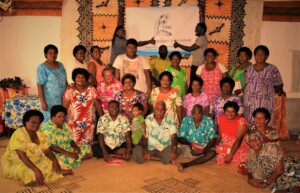
Connecting to markets is a daunting task for any woman wanting to sell her products. This is even harder for remote and rural groups like the women of the Udu Point Women’s Initiative who face a multitude of obstacles.
The Initiative comprises 24 women who have come together from four women’s groups of neighbouring villages (Nukudamu, Nabouono, Vunikodi and Udu Point Estate) located along the Northernmost point of Fiji. Dependent on transportation, the women would try to meet at least once a month to share traditional knowledge (weaving techniques), share crops and vegetables and discuss new opportunities for their members.
The women of these communities are well known for their unique weaving skills especially their much sought-after kiluvatu (intricate black geometric designs) mats which used to fetch around FJD 300 before the global pandemic and current economic downturn.
To sell their crafts, the women must travel to the nearest urban centre – Labasa Town. Getting there is a three-hour journey dependent on factors such as high tide, willingness of boat operators and availability of a boat (with enough fuel), cost of transportation (by boat and road totals around FJD 600) and their supply of voivoi (pandanus leaves used for weaving). Some women choose not to make the journey at all because it is costly and without proper planning and contingencies, the women can find themselves overnighting at Qaranivai landing waiting for high tide to arrive the next day.
“Alongside our remoteness and communications challenges, the global pandemic brought us new challenges. We found that we could no longer sell our mats as this had become too costly for locals to purchase. We didn’t let this deter us, we had to come up with new ways to survive,” said Milly Rasovo, President of the Initiative.
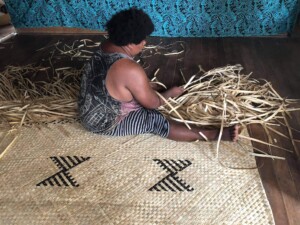 |
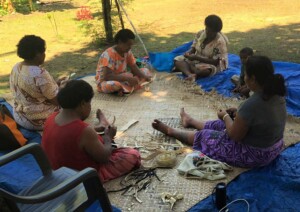 |
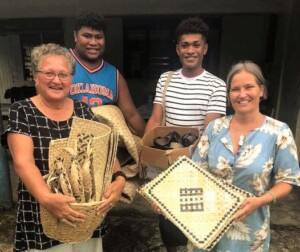 |
New skills having a positive impact on the community
In May last year, the Initiative received an FJD 10,000 grant from the Fiji Women’s Fund (the Fund) to assist it with strengthening its network and administration and to also invest in its member’s potential to grow their microenterprises, leadership and confidence to speak up and advocate on women’s issues in their communities.
The grant has meant the group can consistently hold their monthly collective meetings. They’ve maximised on this opportunity, using the space to share issues, identify solutions, share skills, learn together and strengthen their network.
It was at this space that the women resolved to address their livelihoods challenges by identifying alternative income-generating sources and how the members could work together to access new markets and opportunities.
The idea arose to change their product line to offer smaller and more affordable handicrafts such as smaller-sized mats, baskets, and earrings. These products are now earning around FJD 50 – 250 per month. The women also used Facebook to reach out to friends and family to market their handicrafts. To reduce travel costs, the Initiative elects two members to make the journey to Labasa once a month to sell their handicrafts.
The grant also allowed the women to immerse themselves in learning and capacity development. With the support of the Fund, the women have already undertaken training in financial grant management, monitoring and evaluation, child protection and gender equality and social inclusion.
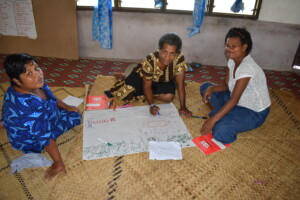 |
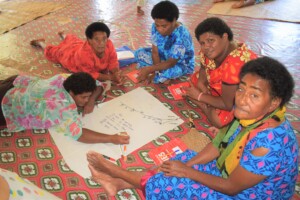 |
Milly says these trainings have helped members step outside their comfort zone and actively participate in discussions during their monthly meetings. To practice leadership, on a rotational basis, a different member is selected to chair discussions, one will take minutes, and another is assigned childcare duties so that the women can participate without interruptions. These changes have helped develop the women’s confidence and have resulted in them being able to voice their views at village and tikina meetings. The women have also received support and encouragement from the Chief of Udu and the Assistant Roko based in Labasa.
In November last year, Westpac Banking Corporation was invited to Udu to provide financial literacy training. The training taught the women budgeting and planning, the importance of saving and basic business financial management. From this training and due to the lack of banking services nearby, the women were motivated to start a savings club and appointed a trusted member to hold the savings box. Each member saved whatever they could into the savings box each month. At the end of the year, four members pooled their savings to start a canteen and another used the savings to expand the women’s bakery. Both microenterprises now supply the surrounding communities with groceries and fresh bread.
The awareness created also resulted in members’ diversifying their income sources. One member who previously relied solely on jewellery-making, has now started a small poultry farm. The chief baker in the women’s bakery recently learned how to screen-print at one of the collective meetings and has already sold 12 metres of printed material through a partnership with a shop in Labasa. Another member, who previously bought vegetables from market vendors to sell in her community is now growing and selling her own vegetables thus increasing her profits.
Their personal stories indicate a drive towards self-sufficiency, forward planning for income security and the fruits of budgeting. The women’s collective space has also been key to strengthen the bonds between members, shared knowledge which also benefits the whole community. Apart from their own development, many of the women have reported noticing behavioural changes in their husbands.
“Having attended some of the training alongside the women, the men in our community realised the importance of assisting the women because their earnings are supporting the whole household. Now we see the men helping their wives to walui, which is the final process to smoothen the voivoi leaves for weaving,” said Milly.
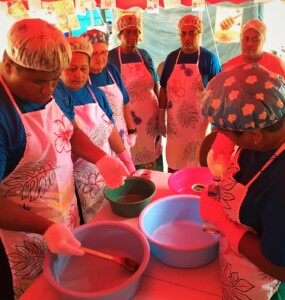 “Through this project, I have seen many small but positive changes happening in my community over the past 12 months. We have learned so much and the women have been exposed to new ideas and skills. We would like to implement many of these new ideas but we understand that it cannot happen overnight, and we must do it slowly within our traditional context,” she added.
“Through this project, I have seen many small but positive changes happening in my community over the past 12 months. We have learned so much and the women have been exposed to new ideas and skills. We would like to implement many of these new ideas but we understand that it cannot happen overnight, and we must do it slowly within our traditional context,” she added.
This month members also travelled to Viti Levu on a peer-learning exchange with other women’s groups. They learned about the solesolevaki (sharing of workload) approach and oyster mushroom farming from the Naitasiri Women in Dairy Group, starting and managing microenterprises from the women of Namuka Nakelo (a South Pacific Business Development microfinance grouping), organic farming techniques from Eileen Chute who runs the Bulaccino Farm in Nadi and a two-day visit to the Pilgram Farm in Nadi where they learnd soap making, floral arrangement, virgin coconut oil prodecution techniques and the importance of self-care and wellness.
To purchase handicraft from the Initiative, please visit their Facebook Page.
About Udu Point Women’s Initiative
The Udu Point Women’s Initiative was established in 2016 and comprises 24 members from four women’s groups from the villages of Nukudamu,Udurara, Vunikodi and Nabouono on Vanua Levu. The women, who are from minority ethnic groups (part-European, Rotuman and Tongan), gather monthly to share ideas and skills among themselves.
Recent Whats New
Centre helps women build confidence, improve skill set
October 17 2024
A journey to self-care: My retreat experience in Bodrum, Turkey
October 15 2024
Skills training empowers women on island
October 4 2024
Women’s network launches strategic plan, hosts craft show
September 25 2024
